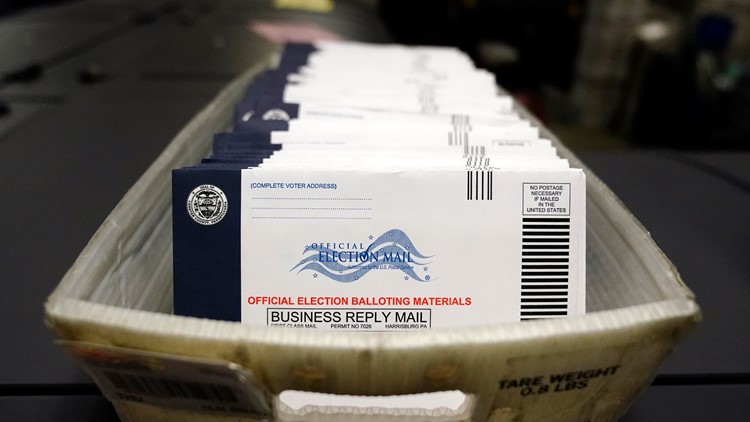HARRISBURG, Pa. — Nearly 600,000 Pennsylvania voters have applied for mail-in ballots ahead of the municipal primary election on May 18, the Pennsylvania Department of State said Monday.
In addition to the more than 587,000 mail-in ballot applications received, the department said another approximately 18,000 voters have applied for absentee ballots.
“These impressive application numbers show that mail-in voting has become a popular option for Pennsylvanians, valued for its convenience, accessibility and security," acting Secretary of State Veronica W. Degraffenreid said in a press release. "People like being able to vote from their own homes and on their own schedule. If mail ballot applications continue at this pace, we could be on track to set a record for participation in a municipal primary.”
Voting by mail ballot without having to provide an excuse is relatively new to Pennsylvania, the department said. The bipartisan Act 77 of 2019, signed into law by Governor Tom Wolf, represented the first major reforms to the Pennsylvania election law in over 80 years, according to the department.
Any eligible voter may apply for a mail-in ballot. Applications may be submitted online via the Department of State’s website.
Once voters return their mail-in ballot application to their county board of elections, the county will send them a mail-in ballot as soon as the county’s ballots have been finalized and printed, according to the Department of State.
When they receive their ballot in the mail, voters simply need to read the instructions and mark their ballot, then seal their ballot in the secrecy envelope that indicates “official election ballot,” seal the secrecy envelope inside the pre-addressed outer return envelope, sign and date the voter’s declaration on the outside of the outer return envelope and put a stamp on the envelope if needed.
Mail-in and absentee ballot applications must be received by a voter’s county board of elections by 5 p.m. on Tuesday, May 11. Voted mail ballots must be received by the county board of elections by 8 p.m. on Election Day, Tuesday, May 18.
In the municipal primary election, voters who are registered as Republican or Democrat will choose their parties’ nominees for seats on the Pennsylvania Supreme Court, Superior Court, Commonwealth Court, county Common Pleas Courts, and Philadelphia Municipal Court, Degraffenreid said.
Also on the party ballots will be a wide variety of county, school board, and local seats such as mayor, city or borough council member, township commissioner or supervisor, magisterial district judges, and precinct election officials.
All registered voters, regardless of party affiliation, will be eligible to vote on three ballot questions in the primary election. Each ballot question deals with a proposed amendment to the state Constitution, Degraffenreid said.
In addition, Degraffenreid said, all registered voters in the following four districts, regardless of party affiliation, will be voting in special elections to fill vacancies:
22nd State Senate District (Lackawanna County and parts of Luzerne and Monroe counties)
48th State Senate District (Lebanon County and parts of Dauphin and York counties)
59th State House District (parts of Somerset and Westmoreland counties)
60th State House District (parts of Armstrong, Butler, and Indiana counties)



